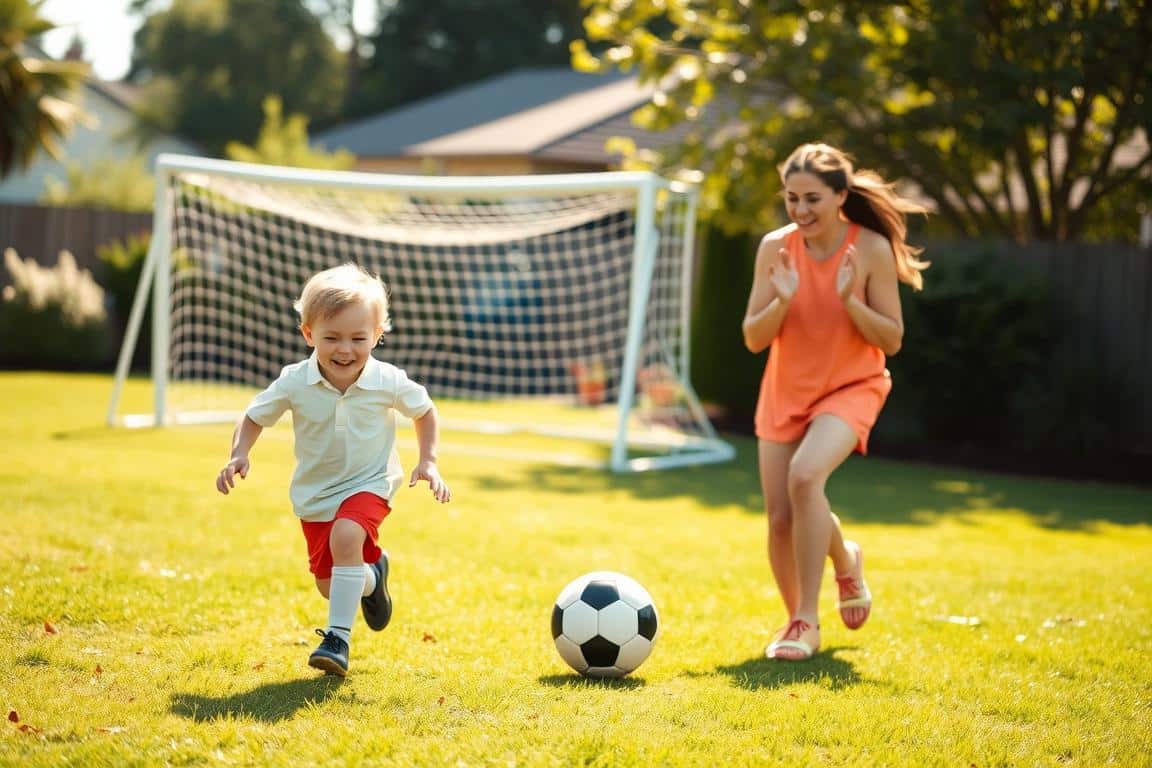How to Support Your Soccer-Playing Child Today

I write from the sideline and at home with one clear aim: show simple steps you can use right now to build a healthy love for soccer and life.
Positive words, calm sidelines, and praise for effort change how kids view the game. I focus on small habits that raise confidence without pressure.
Keep postgame chats brief. Let the coach lead playing-time talks and encourage brave mistakes as learning moments.
We will cover easy routines for game day, short practice ideas, and ways parents can build team friendships. These steps help skill growth and long-term development while keeping soccer fun.
Key Takeaways
- Praise effort, attitude, and teamwork rather than just scores.
- Keep sideline coaching calm and focused on cheering.
- Let your child speak with the coach about goals and playing time.
- Celebrate small wins with video highlights or short praise.
- Use a simple postgame line: “I loved watching you play,” then listen.
Start with a positive soccer environment at home and on the field
A peaceful sideline and a cheerful home shape how kids feel about sport. I model calm body language and a steady smile so the game reads as fun, not tense.
Model calm, supportive sideline behavior
Stand relaxed. Use short cheers like “Great effort!” and avoid coaching from the field line. Show respect for referees and both teams. This teaches kids fair play and good manners.
Praise effort, attitude, and sportsmanship over wins
Tell your child you noticed hustle, quick recovery, or a good first touch. Praise attitude and teamwork more than goals. This builds steady performance and a lasting love of the sport.
Keep postgame emotions steady and joyful
Say, “I loved watching you play,” and wait to see if they want to talk. Skip postgame breakdowns in the car unless asked. Let family time stay light so kids want to play games next week and next season.
- I smile on the sideline so soccer feels like a happy experience.
- I call out short, supportive lines and avoid instructing from the field.
- I treat mistakes as normal and praise brave attempts that lead to growth.
How to support your soccer-playing child on game day
I keep game day simple and calm. A clear sideline helps players stay focused and confident.
Avoid coaching from the sidelines
Do not give tactical calls. Shouting instructions can clash with the coach and distract a player on the field. I cheer, not coach.
Use simple encouragement that matches team goals
Match your cheers to the coach’s plan. Say short lines like “Great press!” or “Nice switch!”

Skip instant analysis after the game unless asked
Wait for your child to talk. If they want feedback, ask one or two questions:
- What felt good?
- What was hard?
- What will you try next?
Celebrate specific moments your child has been practicing
Point out one practiced skill like a good pass or a brave attempt. Praise the effort and courage.
| Do | Don’t | Why it helps |
|---|---|---|
| Cheer short, positive lines | Shout tactical commands | Keeps players focused and reduces anxiety |
| Notice one practiced skill | Give a long critique after the whistle | Reinforces training and builds confidence |
| Let coaches handle tactics | Try to direct subs or positions | Respects team roles and the coach’s plan |
| Keep the ride home upbeat | Analyze every play immediately | Preserves the love of the sport and reduces stress |
Best default line: “I loved watching you play.”
For more parent tips, see team parent advice.
Help your child own their development with coach and team
Letting kids own small steps builds confidence and steady progress on the field.
Encourage direct talk with the coach. I ask my player to request a brief chat about playing time and goals when they feel ready. This teaches respect and clear communication with coaches and helps the player set a simple plan.
Before the meeting, we write two or three questions. This keeps the talk focused and calm. I remind my child that coaches appreciate clear, polite questions from players.
Weekly check-ins that matter
Each week I ask, “What did you work on in practice?” and “What is hard right now?” These short questions keep development on track.
We pick one skill to track, such as first touch or scanning. Then we revisit it after the next session and note one small gain.
Cheer brave mistakes that lead to growth
I celebrate risky plays that show learning. After a brave mistake, we reflect on what the player saw and what they might try next time.
- I encourage meetings with the coach so players learn to speak up respectfully.
- I help set a clear goal and a simple daily plan, like five minutes of wall passes.
- I remind my player that sport growth is small steps stacking over a season and life.
| Action | Why it helps | Quick tip |
|---|---|---|
| Meet the coach | Builds confidence and clarity | Bring 2 questions |
| Track one skill | Focuses practice and shows progress | Review after next session |
| Celebrate risks | Teaches timing and decision-making | Ask, “What did you learn?” |
Set realistic goals and build healthy practice habits
Real goals help practice feel meaningful and keep sport playful.
Choose one age-appropriate, measurable skill goal. Pick a clear target, like 20 clean first touches or five accurate long passes. Small wins make progress visible and boost confidence.
Keep practice short. I set 10–15 minute blocks at home. This protects school work, friends, and energy.

Balance training time to prevent burnout
Plan two or three focused sessions each week and keep rest days open. Steady, light practice beats random marathon sessions for long-term development.
- I track one or two numbers, such as juggles or wall passes, so progress is clear.
- I check in with the coach when workload feels high to match team plans and protect performance.
- If my child seems tired or moody, I pause the plan and choose recovery instead.
| What | Why | Quick rule |
|---|---|---|
| One clear goal | Focuses practice and shows gains | Pick 1 measurable skill |
| Short time blocks | Preserves energy and joy | 10–15 minutes |
| Limited sessions | Prevents burnout and aids performance | 2–3 days/week |
Build community and keep soccer fun for your family
I believe a steady group energy makes the season richer. A calm sideline and kind parents shape the team experience and keep sport joyful.
Support team culture and parent-to-coach trust
Ask clear questions and give space. I touch base with the coach politely and respect decisions. This builds trust and helps the coach lead well.
Encourage friendships and empathy within the team
I nudge my children to check on teammates, share the ball, and cheer others. Short meetups after games help kids bond beyond practice.
Use video highlights to celebrate progress, not to add pressure
Record a few clips and watch them together. Use tools like Trace PlayerFocus to follow one player and spot small wins.
- I keep sideline talk positive so team culture stays steady.
- I protect family time around games and keep routines simple.
- We ask, “What did you like?” before asking what to change.
| Action | Why it helps | Quick tip |
|---|---|---|
| Positive sideline | Creates safe space for players | Use short cheers |
| Respect coach | Builds trust and smoother practices | Ask 1 clear question after a game |
| Share video clips | Highlights progress and joy | Watch together and praise effort |
Conclusion
Keep the big picture in mind: sport should feed curiosity, not stress. A calm sideline, short praise, and steady routines help players grow on the field and in life.
Skip sideline coaching. Trust coaches and use short cheers so a player can read the game with a clear head. Praise effort, attitude, and sportsmanship more than goals.
Let the child ask questions and set one simple skill goal that fits age and time. Balance practice and rest. Cheer brave mistakes — they teach smarter decisions.
Build community and use video highlights for joy and learning, not pressure. Use this short line after a match: “I loved watching you play.” For more ideas, see how to support your child in.
